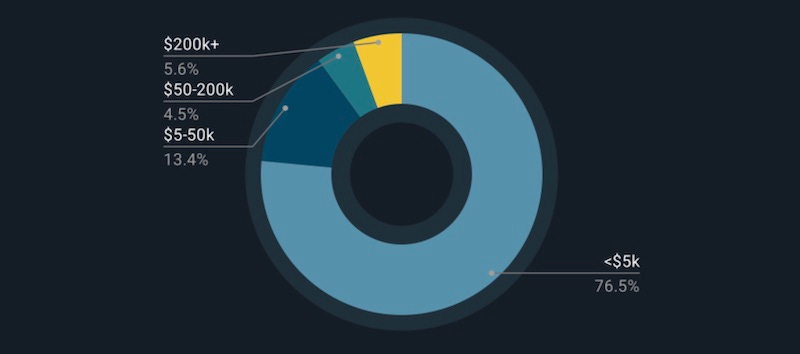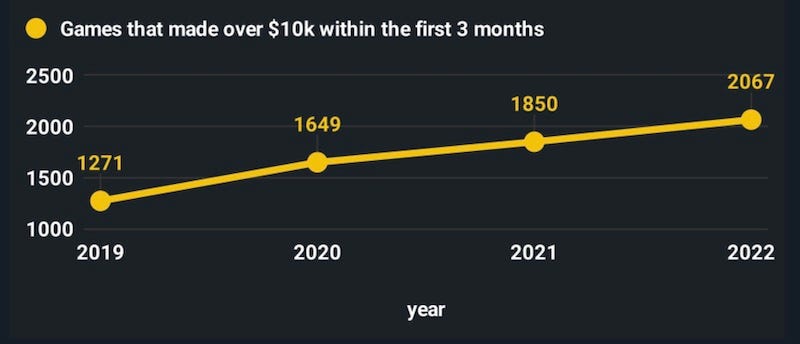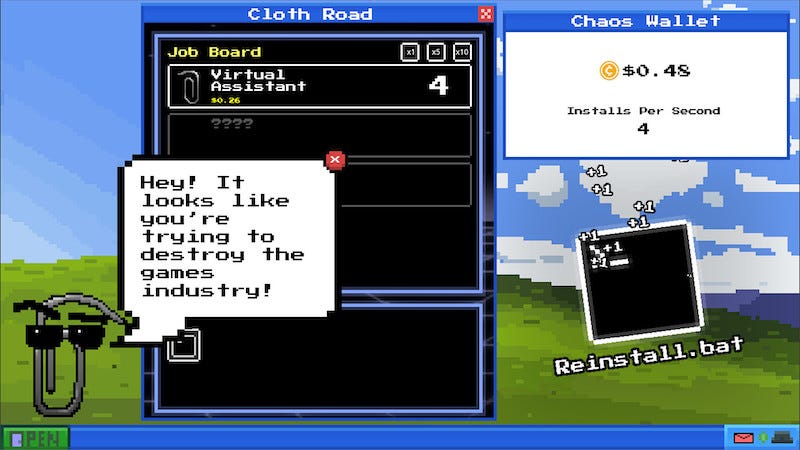Most PC games gross <$1,000: should we be worried?
A scary stat, or not? Also: Epic's biz model changes & discovery news.
[The GameDiscoverCo game discovery newsletter is written by ‘how people find your game’ expert & company founder Simon Carless, and is a regular look at how people discover and buy video games in the 2020s.]
As we amble into the month that contains Halloween (oooo!), GameDiscoverCo is back with some spooky ruminations. We start with a terrifying tale for all game devs: what if you launched your game and your revenues were… more spectral than real?
Otherwise, a little shout-out to Dene Carter (Fable franchise co-creator), who just released Moonring for free on Steam, I remember playing his game Druid in the ‘80s - and this new title (almost 30 years later!) was made for “the love of old-school RPGs and the Ultima series”, but has Rogue-ish twists. Retromation digs it, too!
[NEW & HOT: our upgraded Plus PC game data suite is here - you can subscribe to Plus now to get full access to it, weekly PC/console sales research, an exclusive Discord, six (!) detailed game discovery eBooks - & lots more. Check out this newsletter for details on new features.]
PC games: do we worry about the bottom 50%?

So, you may have seen other versions of the above graph. It’s pretty darn easy to publish your game on Steam nowadays - all you need is $100 to pay Valve and an idea. As a result: over 50% of the games on the platform have grossed <$1,000 LTD (lifetime to date), according to analysis from GameDiscoverCo’s Data Fellow.
Here’s bonus data: it’s getting busier. In the last 3 years, more than 41,000 games have been released on Steam, which is 58% of the total currently live on the platform. The outcome for these, we believe, is even less impressive, if you are focused on making $:
So how concerned should you be, if you’re trying to make PC games professionally, by these two charts? Well, here’s what we would say at GameDiscoverCo:
Most of these <$5k games are hobbyist projects: it’s very difficult - if not impossible - to work out which games on Steam are made by solo devs vs. paid teams. (We’ll come back to that later!) But the lowest revenue tier is - for sure - a lot of games people are making mainly for fun, with revenue being a bonus.
Many of the teams making hit games are tiny and/or bootstrapped: in our view, we’re seeing an increase in high-grossing games that bubble up from the ‘hobbyist’ tier. On the more premium end, Raft-like Sunkenland has popped up almost out of nowhere. And ‘cheaper, but great stripped-down gameplay’ titles like Thronefall - which we’ll cover on Wednesday - are from just a two-person team.
The video game ‘bathtub’ is getting fuller and fuller: the big trend at play - please check out our piece on supply & demand being the ‘hidden levers’ of the market. With a ‘no-reset’ PC and console generation, we have more and more great games out there, bigger backlogs, and - all around - a high supply of titles.
The market isn’t a disaster. Heck, there are still - in total - more new games being successful than previous years. Valve previously affirmed this back in 2020, and GameDiscoverCo’s Data Fellow updates with the following estimates:
But what we think has changed is two-fold: firstly, the amount of investment going into the PC/console game market isn’t transferring to reliable returns. The biz is become more hit-driven (& recurring GaaS revenue-driven) over time, and it’s far from clear that publishers signing games & applying ad spend to them can create a hit.
And secondly, the democratization of the space means that a fair amount of self-published, bootstrapped games are bubbling up into these ‘higher-grossing’ spots. If you twin that with older ‘catalog’ games (at much-reduced pricing!) still being attractive to new players, you have the key elements in place for a market squeeze.
And heck, when you can’t really tell the difference between solo dev games like Nate Purkeypile’s The Axis Unseen and much higher-budget titles, you should start asking the question - what’s the actual advantage of funding or publisher aggregation here?
[Our take: modestly staffed publishers fishing in the right subgenres who split their bets between many low-budget titles are weathering this storm. But anyone who’s been aggressive in trying to scale and didn’t come up with a giant, recurring-revenue hit is having - and will continue to have - a rough time. What worked in 2018 won’t work in 2023 - it’s the market!]
Epic’s ‘5.0’ pivot: surprising, but maybe inevitable?
Were we expecting a big restructuring at Epic Games, including laying off around 830 people & 250 more spinning off due to Bandcamp & (a chunk of) Superawesome divestitures? Nope - it’s the biggest company shift since Fortnite launched in 2017.
We get a little context via the internal note from Epic CEO Tim Sweeney, in which he admits: “for a while now, we've been spending way more money than we earn”, and adds: “While Fortnite is starting to grow again, the growth is driven primarily by creator content with significant revenue sharing, and this is a lower margin business than we had when Fortnite Battle Royale took off and began funding our expansion.”
Sadly, lots of smart people got caught in the layoffs, including a lot of the Epic MegaGrants team and EGS Director of Publishing Strategy (& SteamSpy creator) Sergei Galyonkin, who posted on Twitter/X, noting: “Epic Games is on its way to transforming from a game developer, engine creator & publisher into a platform - Epic 5.0.”
What does this mean though, realistically? We suspect ‘Epic 5.0’ means the following:
Epic Games Store has ended up being largely a failure: the company paid out hundreds of millions of dollars for ‘PC-first exclusives’ that didn’t lead to great EGS retention. As we analyzed back in 2021: “in the absence of community or critical mass, players will visit platforms only to buy exclusives or get free games.”
Fortnite is the ‘platform’ with actual retention, so that’s the pivot: when you realize you’ll be able to make pretty much any kind of Unreal Engine game (eventually!) on the 20-25 million DAU platform, there’s two ways to go: more diverse internal game modes (which they are hiring for), and near infinite third-party Fortnite Creative content (which we covered a couple of weeks ago!)
There’s a lot of opportunity to monetize & expand Fortnite as a platform: Epic started with a V-Bucks pricing increase. But it certainly seems like the game has been (abstractly) under-monetized compared to a lot of F2P models - with official skins and Battle Pass being the main sources. Are we going to see - at the very least - player-created skins, and possibly more complex monetization? Yep.
The only thing that gives us pause right now - why is Epic not further along with Fortnite modding capabilities? Starting to pay out hundreds of millions of $ to creators is great, but as Cabbage Systems’ Kevin Cancienne told us: “The range for expression in this platform right now is still relatively narrow… You can't make new inventory items, you can't make new weapons - there's tons of stuff that is kind of constrained.”
This has weird echoes of the Epic Games Store situation. Epic would throw money at the problem of getting games, but EGS notably lagged other stores in community features (reviews, accounts, other connective tissue), and suffered as a result. EGS isn’t going away - but it’s no longer a focus.
It’s possible that lack of EGS features was intentional on Epic’s part - that Tim Sweeney’s privacy-centric worldview forced EGS to be a ‘slim client’. But you can’t do that again for Fortnite - it needs more impressive standalone tools, and soon. (Otherwise, you’ll be paying teen meme map modders their share of $400m for years, without the gameplay diversity that’ll bring in new players.)
Still, Epic has some aces up its sleeve. We’re guessing that the Epic x Lego ‘metaverse experience’ will premiere within the Fortnite ecosystem, for example, and the idea of an open-world survival crafting game as an official Fortnite mode is kinda.. cool, right? It’s just rough that the company’s product sprawl had to be ‘course corrected’ so harshly from an employee loss PoV.
The game discovery news round-up..

Well, let’s distance ourselves briefly from the slight doominess, with some good ol’ game platform and discovery news. Here we go:
PlayStation uberboss Jim Ryan “has made the decision to retire in March 2024 after almost thirty years with the PlayStation business.” In his note to fans, he says “I’ve been finding it increasingly difficult to strike the right balance between having my home in the UK and my job in the United States.” His successor is unclear, and Sony’s at a key ‘roll out big live service games plz?’ juncture, so there’s everything to play for…
A good piece from David Kaye written for game devs, ‘Why investors hate content risk and how to overcome it’, for which he suggests solutions to make you a bit more, uhh, plausible: “Show proof of demand; put a ‘designer founder’ on the team; convince us you have a tailwind; create a differentiated go to market strategy.”
Ubisoft’s CEO Yves Guillemot has been talking about that weird Activision ‘cloud licensing’ deal that made UK regulators happy, saying: “When Netflix first said it was going to go into streaming, their shares fell a lot and they were widely criticised. Today we see what they have become. It’s going to be the same with video games but it will take time. But when it takes off, it will happen very quickly.” Uh… sure?
Just to highlight how crowded the PC/console platforms are this holiday: The Verge looks at October 2023’s killer release list, including Super Mario Bros Wonder, Spider-Man 2, Alan Wake 2, the new Forza Motorsport game, Roblox & Honkai Star Rail on PlayStation, and more.
We didn’t have a chance to go deep on Meta’s Quest 3 in last week’s newsletter, but RoadToVR has a super-detailed preview of the VR/AR device, concluding: “Quest 3 is an impressive leap in hardware, especially in the visual department, but it continues Meta’s tradition of building great hardware that feels held back by its software.”
The console discounts & bundles are also hotting up for the 2023 holidays: Xbox seems to have a few $50 off/’free game’ deals with Series X ($500) at specific retailers, and PlayStation’s official Spider-Man 2 hardware bundle is confirmed to roll out October 20th, probably for $500. (There’s a console war still on, over here!)
Former Sony exec Shawn Layden put out a picture of his commemorative PlayStation Portable (above), handed to execs after the final PSP came off the production line in September 2014. Total units sold? 82,523,607 units from November 2004 to its final manufacturing date - not bad.
How are Meta’s Quest LTD game sales going? They hit $2 billion in total, but RoadToVR points out the total was already $1.5 billion at Meta Connect 2022, so the revenue ‘run rate’ may be slowing a bit. Ars Technica goes further and compares Quest game sales to the Wii U, to which we say: ‘steady on a minute!’
The latest ‘State Of The Stream’ report on Twitch & YouTube game streaming - for August - reveals: “Baldur’s Gate 3 had an impressive launch, nabbing the #6 spot on Twitch. Based on the launch week of new games in 2023, BG3 tied The Legend of Zelda: Tears of the Kingdom for third place. In September Starfield will be the next contender.”
Turns out Ben Abraham has a newsletter/blog about the ‘greening the game biz’, and recently used some of our unearthed Game Pass hourly playtimes to try to calculate how many tonnes of CO2 are created by playing GP. (We’re not saying this is avoidable, but he is saying it might be offset-able, we suspect.)
Finally, since the game biz apparently isn’t done with clowning on per-download fees for game engines, here’s an interview with some devs who learned Godot to make Install Fee Tycoon, a ‘satirical idle clicker’ which will be out on Steam next week:
[We’re GameDiscoverCo, an agency based around one simple issue: how do players find, buy and enjoy your PC or console game? We run the newsletter you’re reading, and provide consulting services for publishers, funds, and other smart game industry folks.]




Another interesting newsletter! Yes, an incredible amount of games on Steam are pretty much from hobbyists. A staggering number of them don't even work well. But that's just more opportunity for a new era of game media to unearth the gems.
I'm still thinking about that data you guys posted a few months ago, about the big difference between games that attracted audiences versus games that the media covered during the last NextFest. It's an exciting but crowded time for the gaming world.